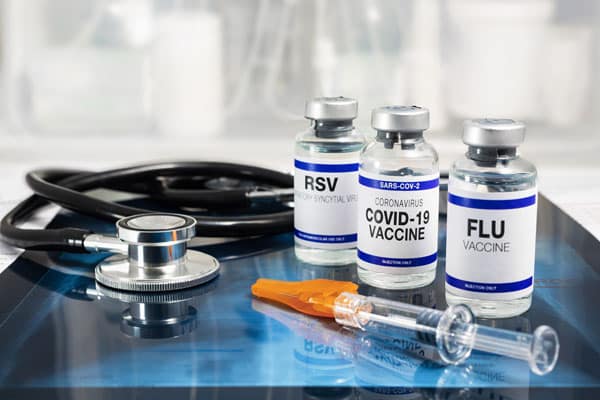The 2023 Seasonal Flu Booster, COVID-19, and RSV Vaccines

Here are the facts concerning the three vaccines recently approved to minimize your risk of severe respiratory illnesses.
New preventive measures for specific respiratory illnesses approved.
As autumn approaches, the need to stay vigilant against respiratory illnesses like COVID-19, Influenza, and RSV (respiratory syncytial virus) remains critical.
Fortunately, the U.S. Food and Drug Administration (FDA) and the CDC Advisory Committee on Immunization Practices (ACIP) have recently approved new vaccines to safeguard the U.S. population from these potentially deadly viral illnesses.
Here's what you need to know about who should get vaccinated and when.
When do these illnesses peak?
As we enter the fall season, the resurgence of COVID-19, Influenza, and RSV is a concern. In 2022, all three illnesses surged in a similar time frame, leading to what is now being referred to as a triple epidemic (tripledemic.)
Unfortunately, predicting the timing and severity of these resurgences is always challenging. The CDC recommends that individuals remain up to date on immunizations. Particularly for viruses such as Influenza and COVID-19, especially during the seasons when these viruses surge.
While the risk of COVID-19, Influenza, and RSV increases with age, these viruses can also be deadly for very young children and infants. Adults under 65 can also become severely ill from these viruses, even without pre-existing conditions.
When Should You Get Vaccinated?
Vaccinations in the fall each year (beginning in September – October) are advisable for most individuals to build immunity against these illnesses.
For most people, vaccination is simply a matter of timing – get vaccinated before illness surges or before your risk of exposure to the illness increases. For example, get vaccinated before you get on a plane or attend a large public or family gathering.
Individuals with multiple health concerns or compromised immune systems may want to consult their healthcare provider before receiving immunizations.
Which Vaccines Should I Get?
It’s important to remember that all vaccines undergo rigorous testing prior to approval for use. The FDA and the ACIP determine these approvals.
However, it is also important that you make informed decisions for yourself and your well-being. This means understanding what the vaccine is for and how it will impact your overall health.
2023 Covid-19 Vaccine
Vaccination remains the best form of protection against COVID-19 illness and its complications.
Pfizer and Moderna's recently approved 2023 COVID-19 vaccines target the currently circulating Omicron XBB variants.
COVID-19 vaccines produced prior to the current 2023 vaccine should no longer be used to protect against COVID-19 illness.
The CDC recommends everyone 6 months and older get an updated COVID-19 vaccine to protect against the potentially severe outcomes of COVID-19 illness this fall and winter.
Influenza Vaccine
The Influenza vaccine has provided protection against various strains of influenza for decades. As a result, the CDC continues to recommend it for all individuals aged six months and older.
The 2023 -24 Influenza vaccines include the following changes:
- All 2023-24 influenza vaccines will be quadrivalent (protect against four flu strains)
- The strains covered by the vaccines have been updated
The influenza vaccine will continue to be in the standard and high-dose versions (high-dose for those aged 65 and older). It is best to get this vaccine before the onset of the influenza season.
According to the CDC, individuals may consider taking both the flu and COVID-19 vaccines (they are separate injections) at the same time for convenience and to ensure readiness for either virus.
RSV Vaccine
The RSV illness doesn’t get many news headlines and feature stories. As a result, we often underestimate its potential contagiousness and severity. Regardless, the RSV vaccine is approved for senior adults aged 65 and older, immunocompromised individuals, and infants under the age of eight months.
The FDA also approved Pfizer's Abrysvo (pronounced uh-breez-vo) for pregnant women. This vaccine can help mothers develop maternal antibodies that pass to their unborn infants and help protect them against RSV through six months old.
What are the Risks of These Vaccines?
All vaccines carry a potential risk for mild side effects. For some individuals, vaccines can pose a risk of more severe side effects, including allergic reactions. However, severe side effects or reactions to vaccines are rare.
The FDA continually monitors and ensures vaccine safety in the United States. Even after a vaccine has been approved for use, professionals who administer vaccines are required to report adverse vaccine reactions.
If you have concerns regarding the safety of a particular vaccine, the Moultrie County Health Department (MCHD) encourages you to consult with your healthcare provider for their recommendations.
The MCHD urges you to protect yourself and your loved ones.
As we prepare for the seasons ahead, vaccinations remain crucial in our defense against the respiratory illnesses that continue to threaten our health.
“This is the first fall and winter virus season where vaccines are available for the three viruses responsible for most hospitalizations – COVID-19, RSV, and flu” said CDC Director Mandy Cohen, M.D., MPH.
The MCHD encourages you to protect yourself and your loved ones. Consider getting the Influenza and COVID-19 vaccines. Consult with your healthcare provider about the RSV vaccine if you fall within the recommended age groups.
Above all, whether you receive the vaccines or not, stay vigilant and healthy. Let science, your trusted healthcare provider, and common sense guide your healthcare decisions.

